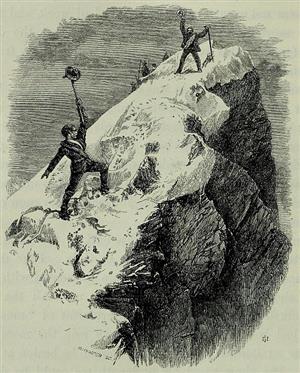
Danger at the Top
Published in Conflict ResolutionThink about your team’s response to achieving a long-sought and hard-won objective.
Do you take time to celebrate or get right back to business?
Does your team’s success inspire vigilance to protect what’s been achieved, or does your organization lapse into complacency?
Mountaintop experiences can be energizing. They also can be deadly.
Triumph and Tragedy
On the Italian-Swiss border 150 years ago this month, five mountaineers and three guides led by British adventurer Edward Whymper became the first men to reach the top of the Matterhorn.
The early 1860s were known as the “Golden Age of Alpinism” and several climbing teams had attempted to reach the summit of the Matterhorn, Europe’s highest mountain that had yet to be conquered.
Edward Whymper tried unsuccessfully to climb the Matterhorn on several attempts, and by July 1865 Whymper’s British team was racing against an Italian team led by Jean-Antoine Carrel to be the first to do so. The stakes were as high as the Matterhorn: personal fame, patriotic bragging rights, and international recognition. Stakes similar to those in the race to the moon 100 years later. And stakes similar to the rewards you and your team chase today.
In his book, Scrambles Amongst the Alps, Whymper described his team’s exhilaration when they realized they had beaten Carrel’s team to the top: with two hundred feet of easy snow left between the climbing party and the top of the Matterhorn, Whymper and another climber “ran a neck-and-neck race, which ended in a dead heat. At 1.40 p.m. the world was at our feet, and the Matterhorn was conquered. Hurrah! Not a footstep could be seen.”
Whymper’s party peered below and saw Carrel’s team several hundred feet beneath them. Whymper’s team had won the race.
The victorious team stayed on the Matterhorn’s summit for one hour, celebrating and savoring the accomplishment.
But triumph turned quickly to tragedy. Within the first hour of descent, four of Whymper’s party lost their footing and fell to their deaths.
Had the winners become careless? Complacent? Or something else?
In his book written seven years after that fateful event, Edward Whymper recalled he had suggested that ropes be attached to rocks in the most difficult stretches of the descent. The team agreed, but the precaution was never taken and the result was fatal for four climbers.
3 Lessons
What can we learn from this event?
- Leaders are in a race to achieve important objectives, yet the margin of victory can be slim and often depends upon the team’s relentless focus to win.
- Leaders invest considerable time preparing to achieve important objectives. How much time is invested preparing the organization for success?
- Sizing up your objective requires pragmatism and commitment. Winning requires commitment, and commitment always carries a cost. Will the victory be worth it?
Here’s wishing you Godspeed on your personal mountain-top adventure.
Ready to reset?
Attend my free Accountability webinar: I Did It! to set and achieve your 2021 goals.
- February 17th from 11 AM – 12:30 PM Central Time
- My free webinar will help you:
– Sharpen your personal goals
– Improve time management
– Tackle tough work-related issues
– Support remote workers
Learn More
To dive even deeper into the topic of accountability, I invite you to purchase a copy of my bestselling book, “Accountability: The Key to Driving a High-Performance Culture.”
Become a better leader.
Download my three free e-books.
Free Tips
Sign up to receive free tips on business, leadership, and life.
Get My Latest Book
HOW LEADERS DECIDE
History has much to offer today’s current and aspiring leaders.
Business schools teach case studies. Hollywood blockbusters are inspired by true events.
Exceptional leaders are students of history. Decision-making comes with the territory.



